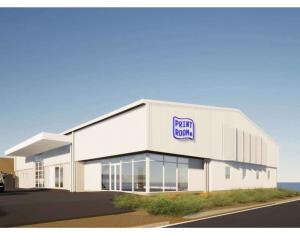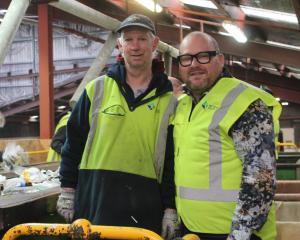
As a fairly frequent flyer to destinations around the globe, he is never to sure exactly what to put down as his occupation on the arrival and departure cards.
"I change it every other day; it could be engineer, director ... I have no bloody idea, to be honest," he said.
Mr Beeby is the director and owner of Dunedin-based Groundwork Group, a role which he simply describes as spending all day talking to people from all over the world. Oh, and drinking lots of coffee.
After leaving school, Mr Beeby spent 30 years in the civil contracting industry before establishing Groundwork.
The business started from his home — "a little, tiny office where most people start" — and later moved into offices in Stafford St.
It began with selling a machine to a man in Oklahoma, then $1million worth of GPS equipment also to the United States, and it developed from there.
There were several parts to the Groundwork business. It specialised in civil construction equipment and machinery, delivering everything from $100 tools to $500,000 drilling rigs around the world.
"People come to us looking for a bit of machinery. We talk to our friends all around the world, we source and find and deliver," he said.
The company’s largest markets were the United States and Australia, although it once delivered a pile driver to Iraq.
"We sell equipment and we deliver it. The world’s a very small place. The loop is about as small as Dunedin. I probably know more about what’s happening in the world than our backyard," Mr Beeby said.
People also approached Groundwork with ideas that they might not know what to do with. After rigorous testing, it was decided whether to take on the invention and introduce it to the international market.
"If you’ve built an invention and it’s worthy of going global, you come to us and we put it out there," he said.
One such product was RescuePlus, an impact-activated personal emergency device specifically designed for remote workers.The initial idea came from Graham Roper. Mr Beeby found an electronics design team nearby and the innovative technology required was built for it.
"We ended up with a world-first which will change the way staff are protected in the field," he said.
Other products available did not have the same features and its potential was "everywhere", he said.
"That ... is actually going to save people’s lives and change how people operate. It’s a very cool product and it’s a pleasure to say we actually managed to build it in Dunedin. That’s the cool thing about it."
The only part not made in Dunedin was the plastic box it was contained within.
"We’ve managed to build this innovative technology within 500m of my office. There’s a whole heap of IT hidden around Dunedin in buildings.
"You actually can build a unique product in Dunedin if you can get the right type of people together," he said.
Mr Beeby disliked the term entrepreneur, simply saying "we see good ideas and we take them to the market and we just do what we do".
"We’re a global supplier, we find markets, we deliver the goods and ... it’s anywhere."
Being based in Dunedin was ideal for such a business when it came to keeping in touch, with time differences.
"We’re sitting right in the middle of the world where we can talk to everybody on the same day," he said.
The television in his office was on throughout the day, with American news bulletins, keeping him in touch with the world in real time.
Groundwork Group had four staff, plus several consultants. For staff, it was not a conventional marketing job. The business attracted people with passion, willing to learn and had flair in social media, graphics or writing, and wanted to cut their teeth on the international market, he said.
"When they leave here, they have knowledge they wouldn’t be able to buy anywhere," he said.
For someone who has only ever had two jobs, Mr Beeby reckoned this one was the best.
"One of the things we do here, we really do custom-built. If you come to me and say, ‘I want to do this’, because I come from a background of contracting, I know what you want to do. I think we actually like to help people grow their businesses.
"We’ve cut our teeth on the international market. Now we’re going to have a wee go at the domestic market, only because we have the systems and know-how to do it," he said.












